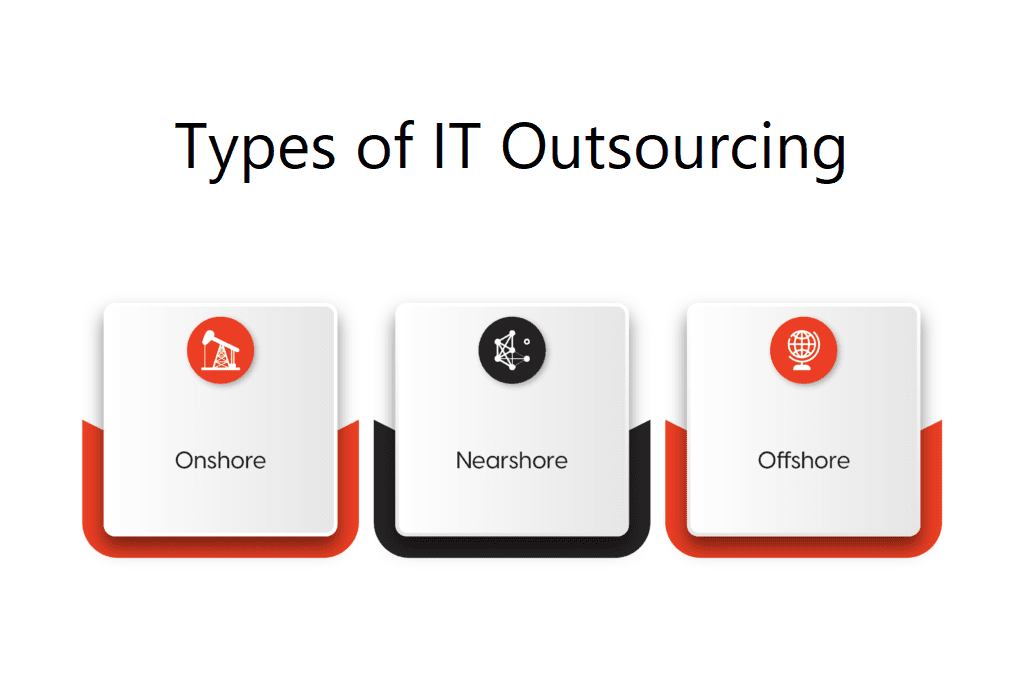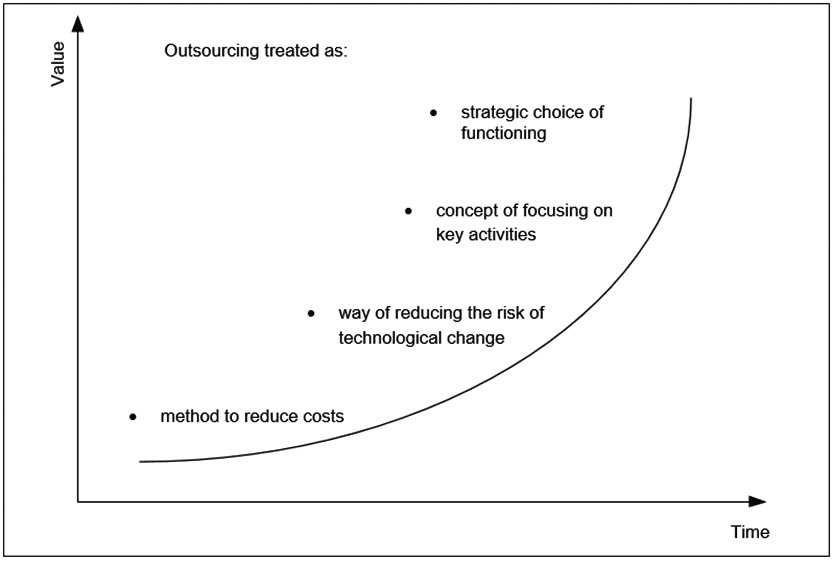The Future Benefits of IT Outsourcing in 2024

Many individuals still don’t know what “outsourcing” actually means, even though technology and IT have improved and the term has been used for a very long time. So let us start by giving a basic explanation of what the phrase means.
IT Outsourcing services is a business approach that has many advantages for organizations. Through outsourcing, businesses can collaborate with outside groups to handle particular tasks or finish projects. Businesses are able to increase productivity and reduce expenses by concentrating more on their core competencies by outsourcing services. Businesses are expected to start considering IT outsourcing more strategically these days.
This article will thoroughly cover the concept, its definition, the reasons for adopting it and the benefits of IT outsourcing in 2024.
What is IT Outsourcing?
When IT services are outsourced, certain IT-related projects are delegated to knowledgeable outside parties. There are certain benefits to this strategy beyond merely financial ones. Through partnerships with seasoned IT specialists outside the organization, organizations can access a plethora of knowledge and cutting-edge solutions that may be outside the scope of their internal resources.
This permits internal teams to focus on essential business operations while also guaranteeing that IT services are managed to the highest standards. To put it briefly, organizations can strategically optimize their budgets and operations by utilizing outsourced IT services.
One great way to speed up development is through outsourcing as a business model. Businesses can increase the productivity of their experts by reducing the workload on them by outsourcing specific phases or full projects.
Current Market Overview of IT Outsourcing
The worldwide market size for IT services outsourcing was approximated at USD 525 billion in 2022, and it is projected to reach approximately USD 1,149.24 billion by 2032. This growth is anticipated to be driven by a compound annual growth rate (CAGR) of 8.2% during the forecast period from 2023 to 2032.
- The IT Outsourcing market is forecasted to attain a revenue of US$460.10 billion by 2023.
- Anticipated annual growth, with a CAGR of 11.07% between 2023 and 2028, is set to drive the market’s volume to US$777.70 billion by 2028.
- The projected Spend per Employee in the IT Outsourcing market for 2023 stands at US$132.10.
- In a global context, the United States is expected to lead in revenue generation, with an estimated revenue of US$167.90 billion in 2023.
Types of IT Outsourcing
Basically, outsourcing is of three types based on the distance between the service provider’s location and the client’s location.
Here’s how each term is typically defined:
Onshore IT Outsourcing
Working with IT service providers situated within the same national borders is known as “onshore” IT outsourcing. There are various benefits associated with this method. When cultural quirks and time zones are shared, communication is easier and more effective. Given their close closeness, they may respond more quickly and even engage in face-to-face communication, which strengthens their relationship. Furthermore, a more seamless compliance procedure is ensured by the fact that the business and the IT supplier are subject to the same set of regulations due to their shared nationality. To put it briefly, onshore outsourcing combines the advantages of proximity, synchronized rules, and improved cooperation.
Nearshore IT Outsourcing
Nearshore IT outsourcing entails collaborating with IT experts based in nearby nations. This model provides a special combination of benefits. In addition to offering the ease of relatively matched time zones, it can be more cost-effective than onshore choices and facilitate easier day-to-day communication.
The integration process may be facilitated by the common cultural components and occasionally even the similar regulatory environments that result from geographic closeness. Businesses can take advantage of the economic benefits of nearshore software development outsourcing without giving up the convenience of collaboration and communication that comes with being close to one another.
Offshore IT Outsourcing
In offshore IT outsourcing, partners collaborate with IT service providers that are situated in remote areas, frequently across continents and seas. Due to the potential cost savings, this strategy is appealing because many offshore areas have lower operating expenses. The sophisticated communication channels of today have made working with teams all across the world easier. But it’s crucial for companies to be aware of potential difficulties, such handling time zone differences, appreciating cultural variations, and guaranteeing effective communication. Businesses can use offshore outsourcing to receive top-notch IT services while staying within their budget by skillfully negotiating these obstacles.
IT Outsourcing Evolution
Source: ResearchGate
The trend of outsourcing is rapidly evolving in IT sector. The time when it was limited to cheaply operated helpdesks are changed in partnership-based models to support them on their journey toward digital transformation. Skills shortages are one of the most important IT concerns that outsourcing is assisting businesses with. Globally IT outsourcing has evolved.
However, the fundamental meaning of outsourcing IT became obscured. Rather of being associated with freeing up time for businesses to concentrate on their main operations, it came to mean slashing costs. Businesses created service-level agreements for different IT tasks and signed contracts with the vendor who offered the service at the cheapest price.
But by the year 2024, IT outsourcing is finally realize its full potential and be adopted as a new normal in the industry.
Outsourcing Software Development Trends for 2024
- Digital Transformation Focus: To support digital transformation projects, IT outsourcing has changed throughout time. Cloud computing, data analytics and artificial intelligence are examples of developing technology that service providers are assisting businesses in implementing.
- Hybrid and Multi-Cloud Strategies: These are increasingly popular strategies being used by businesses. Maintaining, safeguarding and optimizing these intricate environments are greatly aided by IT outsourcing.
- Managed IT Services: Managed services are a growing trend in which businesses contract with specialized companies to handle all aspects of their IT infrastructure management, including servers, networks and security.
- Cybersecurity Services: IT outsourcing places a strong emphasis on strengthening security measures with managed security services and expertise, given the ongoing growth in cybersecurity threats.
- Remote Work Support: As more people work from home, there is a growing need for IT outsourcing services that facilitate distributed workforces’ use of remote infrastructure, collaboration tools and cybersecurity.
- AI and Automation Integration: To boost productivity and cut expenses across a range of IT functions, IT outsourcing companies are progressively utilizing automation and artificial intelligence.
- Data Analytics and Big Data: Outsourcing helps manage and analyze massive amounts of data, providing information for well-informed decision-making.
- Agile and DevOps Adoption: In order to expedite the software development and delivery processes, IT outsourcing is aligning with agile and DevOps approaches.
- Cost Optimization Solutions: As businesses search for ways to cut costs, outsourcing IT services continues to be a financially advantageous way to handle IT-related tasks.
- Vendor Management Enhancement: Vendor management is becoming more and more important to organizations in order to make sure that their partnerships with IT outsourcing providers are valuable and well-managed.
8 Main Benefits of IT Outsourcing in 2024: A Deep Dive
In today’s dynamic business landscape, navigating the ever-evolving technology landscape presents a constant challenge. Maintaining secure infrastructure, managing skilled IT staff, and keeping pace with the latest trends require significant resources and expertise. This is where IT outsourcing emerges as a compelling solution, offering organizations a path to increased efficiency, cost-effectiveness, and access to specialized talent.
But beyond a mere cost-cutting measure, IT outsourcing in 2024 unlocks a multitude of benefits that go deeper, empowering businesses to thrive in the digital age.
Here’s a closer look at the benefits of IT outsourcing in 2024:
1. Cost Reduction: More Bang for Your Buck
One of the most significant benefits of outsourcing IT services is its cost-effectiveness. When companies outsource their IT functions, they don’t have to spend money on recruiting, hiring, and training staff or investing in equipment, software, and infrastructure. Instead, businesses can transfer these costs to the outsourcing company, which already has the necessary resources. Moreover, outsourcing IT services streamlines operations and eliminates overhead, minimizing overall costs and increasing profits.
Here are some more key benefits of cost reduction to consider:
- Reduced Staffing Costs: Eliminate the need for a full-time IT staff, saving on salaries, benefits, training, and infrastructure. Instead, pay only for the specific services you utilize.
- Unlock Lower Labor Costs: Partner with providers in regions with lower labor rates, significantly reducing IT expenditure. This is especially valuable for smaller businesses or those with niche technology needs.
- Optimized Resource Allocation: Free up internal resources previously tied to IT tasks, allowing them to focus on core business activities and revenue generation.
2. Expertise on Demand: Accessing a Global Talent Pool
Another reason why many companies decided to outsource was the difficulty in finding qualified specialists. As many as 53% of European companies report difficulty finding IT professionals? It is especially difficult to find employees in this sector in the Nordic countries, Switzerland, Germany, the United Kingdom, and other western countries. In most cases, they seek support from Poland, Ukraine, or further afield, such as India or China. As a result, they can offer higher rates than domestic companies because they have access to a larger base of developers.
Here are some more key benefits of cost reduction to consider:
- Specialized skills: Tapping into a global pool of skilled IT professionals allows you to access niche expertise and specialized knowledge that might be unavailable in your local market. This can be crucial for implementing new technologies, overcoming complex challenges, or adopting innovative solutions.
- Staying ahead of the curve: Leading IT outsourcing providers invest heavily in staying at the forefront of technological advancements. By partnering with them, you gain access to their expertise and the latest methodologies, ensuring your business remains competitive and adaptable.
- Scalability: IT needs can fluctuate unexpectedly. With outsourcing, you can easily scale your team up or down based on project requirements and fluctuating workloads. This flexibility fosters agility and ensures you’re not paying for resources you don’t currently need.
3. Improved Efficiency & Productivity
IT Outsourcing services enable businesses to concentrate on their core activities, such as enhancing products and services, improving customer relationships, and maximizing profits. IT tasks such as data entry, management of technical infrastructure, and network management can be outsourced, allowing companies to allocate their resources and energy to their primary objectives. The freed-up resources can be used to keep up with competitors, launch new products, and improve operational efficiency, maximizing the company’s productivity.
Improving efficiency and productivity is crucial for businesses to stay competitive and achieve their goals. There are several strategies and practices that businesses can implement to enhance efficiency and productivity:
- Streamlined processes: Established IT outsourcing providers have proven processes and infrastructure in place for efficiently managing and maintaining IT systems. This translates to improved uptime, faster issue resolution, and reduced downtime for your organization.
- Increased focus on core business: Offloading IT responsibilities frees up your internal team to concentrate on their core competencies and strategic initiatives. This can boost overall productivity and drive better business outcomes.
- 24/7 support: Outsourcing partners often offer 24/7 support and proactive problem-solving capabilities. This ensures swift resolution to IT issues, minimizing disruptions and preventing them from impacting your critical operations.
4. Access to Latest Technologies
Access to the latest technologies is one of the significant benefits of IT outsourcing for businesses. Outsourcing IT functions allows companies to tap into the expertise and resources of external service providers who are often at the forefront of technological advancements. Here are some key ways in which outsourcing IT services provides access to the latest technologies:
Let’s delve deeper into how it works and how it can benefit your business:
Staying Ahead of the Curve:
- Specialized Expertise: IT outsourcing providers employ specialized teams with in-depth knowledge of cutting-edge technologies. This expertise goes beyond what a small in-house team might possess, keeping you on top of industry trends and advancements.
- Continuous Investment: Providers constantly invest in acquiring and implementing the latest technologies, tools, and infrastructure. This eliminates the burden of significant capital expenditures for your company.
- Early Adoption: Providers often have access to beta programs and early releases, allowing you to leverage the latest innovations before your competitors.
Benefits for Your Business:
- Enhanced Efficiency: Utilizing the latest tools and technologies streamlines workflows, automates tasks, and improves overall operational efficiency.
- Increased Innovation: Access to advanced solutions fosters innovation within your company, leading to the development of new products, services, and business models.
- Improved Competitiveness: By leveraging the latest advancements, you can stay ahead of the competition and maintain a competitive edge in your industry.
- Reduced Risk: Outdated technologies pose security and performance vulnerabilities. Access to the latest solutions ensures your systems are secure and optimized.
5. Beyond Cost Savings: Additional Benefits to Elevate Your Business
Beyond cost savings, IT outsourcing offers several additional benefits that can elevate your business. Here are some key advantages:
- Enhanced Risk Management: Transfer the responsibility for IT management to experts, mitigating internal risks associated with cybersecurity threats, data breaches, and infrastructure failures. Leverage the provider’s expertise and resources for heightened security.
- Improved Disaster Recovery: Reputable outsourcing providers offer robust disaster recovery solutions and expertise, granting you peace of mind and ensuring business continuity in case of unforeseen events.
- Strengthened Security and Compliance: Leading providers invest heavily in advanced security solutions and compliance certifications, protecting your data and systems against evolving threats and ensuring adherence to relevant regulations.
- Cost-effective Solutions: While cost savings are often a primary driver for IT outsourcing, it also provides cost-effective solutions for businesses. External providers can spread the cost of acquiring and maintaining IT infrastructure across multiple clients, making it more affordable for businesses.
6. Rapid fixing of possible errors
One of the key benefits of IT outsourcing is the rapid fixing of possible errors. When businesses outsource their IT functions to external providers, they gain access to a team of experts who are skilled at identifying and resolving IT issues quickly and efficiently. Here are some ways in which IT outsourcing enables rapid fixing of possible errors:
-
24/7 Support: Many IT outsourcing companies offer 24/7 support, allowing businesses to receive assistance and resolve issues at any time of the day or night. This ensures that critical IT issues can be addressed promptly, minimizing downtime and disruptions to business operations.
-
Specialized Expertise: IT outsourcing companies have a team of specialized experts who are experienced in diagnosing and fixing a wide range of IT issues. Their expertise allows them to quickly identify the root cause of problems and implement effective solutions.
-
Access to Tools and Resources: IT outsourcing companies have access to advanced tools and resources that can help them diagnose and fix IT issues more efficiently. These tools can include diagnostic software, monitoring tools, and remote access capabilities.
-
Focus on Issue Resolution: By outsourcing IT functions, businesses can free up their internal IT team to focus on resolving issues rather than spending time on routine maintenance tasks. This can lead to faster resolution of issues and improved overall IT performance.
6. IT outsourcing saves your time
IT outsourcing can be a fantastic way to save time for businesses and individuals alike. Here are some key ways it achieves this:
- Delegation of Tasks: Offloading IT responsibilities to a dedicated team frees up your valuable time to focus on your core competencies and activities that drive the most value for your business. This could include tasks like:
- Network maintenance and monitoring
- Software upgrades and installations
- Helpdesk support
- Security patching and updates
- Data backups and recovery
- Project management
- Increased Efficiency: Outsourcing providers often have standardized processes and tools in place, allowing them to complete tasks more efficiently than you might be able to do internally. This means you get things done faster and with less hassle.
- Improved Expertise: Accessing skilled professionals in various IT fields can significantly save time compared to training your own staff. Providers have the knowledge and experience to tackle complex issues quickly and effectively, reducing the time needed for learning and troubleshooting.
- Reduced Downtime: Outsourcing IT management ensures constant monitoring and proactive issue resolution, minimizing downtime and disruptions to your operations, and saving you valuable time and productivity.
- Scalability: Outsourcing allows you to scale your IT resources up or down quickly and easily based on your changing needs. This eliminates the need to invest heavily in hiring and training staff for short-term projects or fluctuating workloads, saving you time and money.
- Improved Focus: Freeing up your internal team from IT burdens allows them to focus on their core areas of expertise, leading to increased productivity and better results in their respective roles.
- Peace of Mind: Knowing that your IT infrastructure is in the hands of qualified professionals can provide significant peace of mind, allowing you to focus on other strategic priorities without worrying about technical issues.
However, it’s important to consider that successful time-saving with IT outsourcing relies on choosing the right partner with a good track record and clear communication channels. With careful planning and execution, IT outsourcing can be a powerful tool to optimize your time and resources, allowing you to focus on what truly matters for your business.
8. Choosing the Right Partner: Key Considerations for Success
While IT outsourcing presents undeniable benefits, maximizing its potential hinges on selecting the right partner. Conduct thorough due diligence, assess your specific needs, and prioritize factors like:
- Provider reputation and experience
- Security and compliance certifications
- Expertise in your industry and relevant technologies
- Communication style and cultural fit
- Clear service-level agreements (SLAs)
- Scalability and flexibility to adapt to your needs
IT outsourcing in 2024 is a strategic decision that transcends mere cost-cutting. It empowers your business to gain access to specialized skills, improve efficiency, boost productivity, and free up resources for growth. By carefully considering your needs and selecting the right partner, you can leverage the many benefits of IT outsourcing and gain a competitive edge in the digital age.
Best Practices of IT Outsourcing
Effective Communication: The foundation of a successful IT outsourcing project is effective communication. It involves more than just conversing, it involves getting to know one another. Open communication allows companies and IT providers to manage expectations, establish clear objectives and quickly address problems. Ensuring that all parties are in agreement through frequent updates and candid conversations promotes a more seamless and productive collaboration.
Due Diligence: For any business, choosing the correct IT partner is a crucial choice. The thorough process of assessing possible IT providers is known as due diligence. It involves going deeply into their area of expertise, comprehending their prior achievements, and even picking up tips from their mistakes. Businesses can have a better understanding of a provider’s skills by looking through their portfolio, contacting previous clients, and confirming industry certifications.
Efficient IT Outsourcing with Strivemindz
A full-cycle software development company, Strivemindz is a well-established IT outsourcing service provider with a strong track record of success. Reach new heights for your company with Strivemindz, your go-to partner for effective outsourcing. Our cutting-edge technology, devoted staff of seasoned specialists and unshakable dedication to quality assurance make us your reliable partner in lowering operating expenses and expanding your projects.
You’ll free up resources to concentrate on your key strengths, which will spur innovation and growth, by giving us your non-core chores. Join forces with Strivemindz right now to start your road toward operational optimization, increased output, and company potential realization. Together, let’s work hard since success is only a collaboration away!
Conclusion
Outsourcing IT services are quickly becoming more strategic for businesses in 2023. Companies are increasingly relying on outsourcing firms to handle their IT needs and requirements while allowing them to focus on their core activities. Outsourcing IT services provides businesses with various benefits, mainly cost savings, improved efficiency, scalability, access to skilled talent, reduced risks, better compliance, and improved customer focus.
Ultimately, outsourcing IT services can help businesses operate more effectively, increase productivity, and achieve their business objectives.
FAQs
Which of the following is a risk of outsourcing IT functions?
Risks associated with outsourcing IT operations include loss of control, security issues, unanticipated expenses, and communication difficulties. Threats can also come from knowledge loss, legal problems, over-reliance on one partner, and geopolitical reasons. To reduce these risks, careful partner selection, transparent contracts, and open communication are essential.
Is IT outsourcing still relevant in 2023?
Indeed, outsourcing IT still makes sense in 2023 since it gives many businesses access to specialized expertise, cost savings, and flexibility. Nonetheless, the applicability of this varies depending on the business and the organization, with some favoring alternate or insourced approaches.
How can a company select the right outsourcing partner?
Before outsourcing the IT services it essential to ensure that the partner you are selecting is rich in experience, technology, financial stability and cultural fit to handle your project well. Well-defined goals and a robust contract are essential for success.
What is the role of data security in IT outsourcing?
Data security in IT outsourcing refers to safeguarding confidential information, maintaining its integrity and adhering to legal requirements via contractual agreements, encryption and access controls. Staff training, vendor assessment, incident response and risk management are crucial elements.
Can outsourcing lead to job loss in the home country?
Outsourcing does, in fact, have the potential to create job losses in the home country because companies often shift certain services to less expensive overseas regions, which negatively impacts the economy and causes layoffs and pay compression. Depending on the business and area, opinions vary. Some consider it profitable and successful, while others worry about the possible harm it could do to domestic work, which is vulnerable to the whims of politicians and labor market fluctuations.



